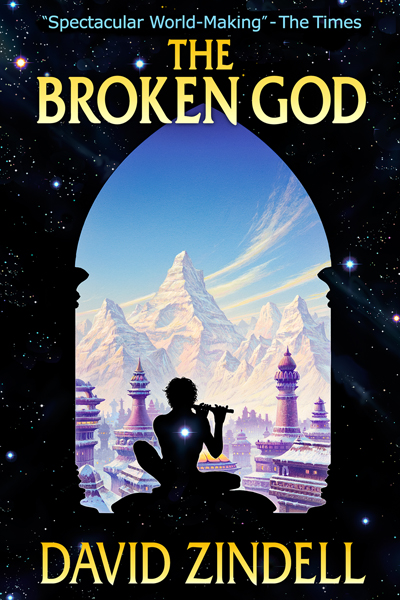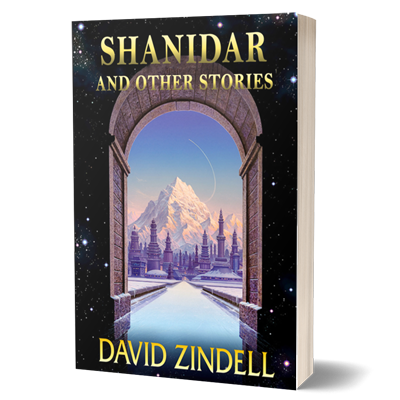 So, Mallory Ringess had a son. Many great men do, but often the son himself does nothing great enough to warrant a story being told about him as well. Danlo wi Soli Ringess, though, like his father has a singular fate, and around him constellate great people and great events.
So, Mallory Ringess had a son. Many great men do, but often the son himself does nothing great enough to warrant a story being told about him as well. Danlo wi Soli Ringess, though, like his father has a singular fate, and around him constellate great people and great events.
I’ve never really approved of sequels, even though like most readers I feel pulled to revisit characters and worlds that I’ve come to love. I knew I had another great story to tell – in many ways a far greater story than Neverness. To writers of science fiction and fantasy, the structure of the trilogy suggests itself as readily as Ionic and Doric columns once did to the ancient Greek architects. A trilogy can be a classic form for organizing big stories. Too often, though, such works are only an excuse to get a publisher to commit funds so that an author has a little security for a few years.
Too often trilogies stretch what should be the events and themes of a single novel into three very similar books. I didn’t want to bore my readers that way – and so to bore myself. I wanted to do something different. And so I planned to write three very different kinds of books, which I would call A Requiem For Homo Sapiens.
Having long been an admirer of Herman Hesse and his Demian, Narcissus and Goldmund, and The Glass Bead Game, I had always wanted to write my own Bildungsroman: a novel of education. The first book of my trilogy, then, The Broken God, was to be a coming of age story. The Wild, the second book, I conceived as a pure quest novel. AndWar In Heaven, true to its name, would concern a vast, interstellar war to determine the fate of the universe.
Of course, I wanted to expand upon some of the themes and open questions from Neverness. What really happens to Mallory Ringess? Must the Order, old and decadent, collapse altogether? Which of the galaxy’s gods will prevail in becoming the masters of all space, time, energy and matter? Can anyone stop the Architects of the Cybernetic Universal Church from blowing up the stars?
At first, it seems that my hero, Danlo, shouldn’t have any main part in the great drama of his times. A child of war himself – and of incest and other abominations – he should never even have been born. Having been born, in terrible violence, on an ice-locked island far from civilization, he should never have survived. Survive he does, however, even as his adoptive people, the Devaki tribe, perish of a mysterious disease. He survives the riddle recitations and the cutting knife of his initiation into manhood, which will be interrupted by more death and will leave him with an unanswered question: How do you capture a beautiful bird without killing its spirit? Only by finding the answer to this seemingly unimportant question will he be able complete his amazing journey into life and become a true man.
Danlo survives other journeys, too, and each in its own way could be called amazing. I have written only one other character – Kane, in my fantasy books – in whom the pulse of life beats so strongly as it does in Danlo. How else could he endure, while still really a boy, a journey by a dog sled alone across six hundred miles of jagged ice in cold nearly bitter enough to freeze the breath? A terrible, terrible journey of frozen flesh and starvation that would kill most strong men? And how, if not for his wild joy of life, his natural animajii that gives him balance, beauty and grace, could he abide all the decadences and insanities of the very unnatural Unreal City?
This will lead to a deeper question: How could Danlo, who dares to become an asarya who would say yes to all things, affirm the shaida – the disharmonies and evils – of a great stellar civilization that seems to have lost both its sense and its soul?
Danlo the Wild, as people call this primitive boy/man, enters this civilization as very much a stranger in a strange land. He must learn a great deal to survive there, too, both psychically and physically.
I had some fun with that learning. In his ignorance, he nearly kills – and eats! – a great-souled being who will become his teacher. He plays, and then eventually outplays, that teacher in a mind-spirit game known as Moksha. He experiments with the ways of the Order of True Scientists, a foundation of once-proud seekers of truth that has degenerated into a cult of scientific fundamentalists.
Then he meets his lifelong friend, the brilliantly flawed Hanuman li Tosh, and things take a more serious turn and become much darker. Love and hate bind these two men together in the same way that the interplay between shaida and halla hold the world together. Hanuman li Tosh hates that very flawed world and the fundamental force (God) which created it. In his hubris, in his terrible will to power, he thinks he can do better. And so he creates a Universal Computer and programs it with a form of artificial life that he calls dolls. He believes that, Pinocchio-like, these dolls can be animated and can evolve into a superior kind of life that knows neither suffering, injustice, old age or death.
Inevitably, or so it seems, both Hanuman and Danlo are drawn into the heart of the new religion, Ringism, that has sprung up from the miracle of Mallory Ringess becoming a god. At first a psychedelic religion employing the kalla drug and natural remembrancing techniques to call up the power of the Elder Eddas, it soon becomes corrupted into yet another cybernetic cult. While Danlo continues to embrace the natural and the immanent, Hanuman turns toward the artificial and the symbolic. A single question, a great riddle, will shape their lives: What does it mean to be a god? This turns out to be just another way of asking what it means to be human?
Hanuman’s answer – and this is the sentiment of many Cyberpunk and Transhumanist authors – is that Homo Sapiens will find our deepest purpose in a technological transcendence known as the Singularity. Human beings will use genetic engineering to begin the transformation of the human body; we will use nanotechnology to complete it – and to effect the transformation of every part of material reality. We will become immortal, nearly omniscient and omnipotent, through “downloading” our consciousnesses into computers. These machines will grow ever more hyper-intelligent, powerful and vast, as big as gleaming moons. This total transcendence of history, mind, spirit and flesh will concentrate into a singularity in spacetime beyond which all evolution will both explode exponentially and become completely inapprehensible – at least to the poor, mortal, dumb humans still bound to their all-too-human forms.
The galaxy’s godlings, however, would find in this open-ended evolution humankind’s true destiny. To them it would be like a star bursting into a supernova. They would be like Silver Surfers catching a wavefront of expanding light and riding it outward in all directions into a bright infinity.
The Singularity looms over my Requiem novels like a perfect stellar storm that will sweep the whole human race away. In The Broken God, I plant the seeds for rejecting it – at least in its conventionally technological aspect. I begin to ask a truly vital question: what is technology, really? Sometimes technology is seen as something material only, something external to human consciousness and being that usually winds up deforming both: think of all those images of people with sockets drilled into their bald, wired skulls so that they can insert metal plugs into their brains and “jack in” to the information storms of their computers. That is the kind of technology that Hanuman li Tosh embraces.
I do not. In fact, I loathe and dread it. It’s not that I consider it impossible or even unlikely; rather, I disdain it simply because I find it ugly. Danlo, of course, shares my sensibility. His opposition to Hanuman and Hanuman’s dream of deforming the entire universe will fuel the hatred and tragedies of my trilogy. It will bring out, too, a terrible and beautiful love. And it will lead, at the end of War In Heaven, to a true technology of the human body and soul.
Purchasing Links
The Broken God can be purchased at the following online stores.
Print version: Amazon • Barnes and Noble
Ebook: Amazon • Barnes and Noble • Kobo • Apple Store

